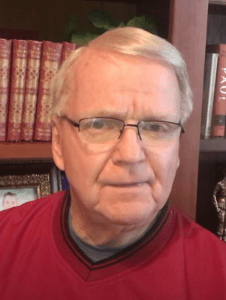I was privileged to be a friend to a remarkable woman most people do not know.
Josephine Scaggs went as a single missionary to Nigeria in the late 1930s. There she spent a big part of her life ministering and, yes, preaching in the bush of Nigeria. I met at least two young men as students at Oklahoma Baptist University in the 1960s who became Christ followers as a result of her ministry.
Josephine, as a college student at the University of Arkansas, had turned down a marriage proposal because the young man did not share her sense of calling to missions. Josephine’s call to missions began when as a young girl on a bright summer’s day she was lying down in the grass and gazing at a blue sky with puffy white clouds. One of those clouds looked to her like the continent of Africa.

Gary Cook
For Josephine, a member of the Girl’s Auxiliary, which was a missions organization in her church, that was it. By “it,” I mean the beginning of her call to go as a missionary to Africa.
She indeed went to Africa and became such an icon in the Nigerian wilderness that she was honored by Queen Elizabeth of the British Empire. Josephine described the moment in her book, It Was Always Africa.
My faith has enough room for mystery in it that I have no issues with the shaping of a life on the shape of a cloud.
‘A sense of oughtness’
The start of my own journey in ministry was not even close to being that dramatic. My calling was what someone called “a sense of oughtness.” It was that sense of calling that I relied on for my entire journey in ministry.
I relied on it, believing it was from God, at so many times in so many ways. It was always in the shadows of my mind as I made decisions about what to do and where to go. However, my humanity was also a big influence as well. Our humanity inserts itself into the process in ways such as personal and family joy in the moment — which includes making a decent living and thus upward mobility in the matters of where and when to go and to stay.
“My calling was what someone called ‘a sense of oughtness.’”
My first full-time church called me to be their pastor two months before I graduated from seminary. The church was in a rural community of 1,500 people built mainly on an economy from farming and ranching. The claim to fame of the town was “the watermelon capital of the world.”
My father was a “country boy,” and he instilled in me his love for all things country. So, being called to a church in a rural location had a certain appeal. I remember thinking if the month of our calling was August and not October, the trunk of our car would have been filled with watermelon and sweet potatoes when we left that Sunday night to go back to Fort Worth.
In my euphoria, I also thought, “We may spend our entire lives right here.” Two years later we were on our way to a college town with the exciting appeal of working with students and their professors.
Learning in two small churches
In those first two churches, I learned how to be a pastor. The gracious people of the watermelon capital taught me much more that I taught them. Some of the people in the second church also taught me a lot as well, but the lessons were painful. It was in those two years that I learned that churches take on some of the best and the worst qualities of their leaders of the past.
“In those first two churches, I learned how to be a pastor.”
I never met the two pastors who preceded me in my second church. I am sure they must have been good men, but their belief systems left behind some people who taught me the hard lesson that all religion is not good religion. The first of the two pastors that preceded me in that church was a fundamentalist before fundamentalism was cool. One of his primary beliefs was, “Thou shalt not have a Christmas tree in the church building.” The pastor immediately before me was a hyper-Calvinist. He had led the church to cease any kind of outreach to people outside the church.
Let me hasten to say both those churches had some wonderful people in them. Both churches continue to minister today as they have all these years since. I am convinced it is the very unusual church that does not accomplish far more that is good than bad over the long haul. I am “bullish” about churches! I thank God for every church of which I have been either a member or fortunate enough to serve for a while as senior pastor.
What denominational leadership taught me
I spent 30 years in five different churches as the pastor. Also, there was a 10-year period of serving on the executive staff of the Baptist Sunday School Board placed right in the middle of my 40 years in post-graduate and pre-retirement ministry. It was during those 10 years that I completed my doctor of ministry degree with my writing project being in the area of pastoral leadership, and it was during those years that my leadership role at the Sunday School Board (Lifeway) was for five years as division director and five years as a vice president in an area of responsibility for all things church-related.
“Being a local church pastor is the toughest job in Baptist life.”
It was during those years that I came to believe that being a local church pastor is the toughest job in Baptist life. If you agree with that statement, then you already know all the reasons I could list to support it. If you disagree, I have no need to convince you I am right.
The truth is it always has been tough, but it has grown exponentially tougher in the last 40 years. Try to imagine the challenge of preaching to a congregation in which the divide in world view is very much like it is in our nation.
It is this reality that impacts tenure in every local church situation. I have deep and abiding respect for those pastors who stay in one church for 25 years or more. This phenomenon is not the norm. I am not completely sure of all the factors that contribute to this possibility, but I suspect it has much more to do with giftedness than anything else. I did not have that gift.
Knowing when to leave
I was extremely fortunate in that I never felt any serious pressure to leave any church. For the most part I felt loved and respected in every church I served. I was appreciated for my work ethic, my leadership and my preaching. However, my giftedness did not seem to contribute to my being “the beloved pastor remembered for generations.” That, I am sure, had more to do with me than the people I served.
One of the last challenges pastors face is knowing when to retire. I became pastor of my last pre-retirement church when I was 49 years old. My 15-year tenure in this church was wonderful. I knew I wanted to retire at age 65, but the question was how to complete my tenure on a positive note.
“One of the last challenges pastors face is knowing when to retire.”
I decided to lead the church to adopt some goals that corresponded with my unannounced plan to retire at age 65. I stated in my presentation of those goals that when I retired and the church called a new pastor, that a new pastor could begin their ministry with the church well prepared for a new beginning.
One of those goals was for the church to be completely out of debt, and with the giving plan I was recommending that could happen the same year I knew I wanted to retire. Also, I began to speak openly and particularly to young adults that I totally understood their looking forward to the day when they could call a new pastor closer to their age. So, I did retire right on time, and the years since have been some of the very best of my life.
To pastors who may be reading this and are in the midst of trying to make a decision about retirement, let me say this: I have been astounded by how much opportunity there is in post-retirement ministry. I truly believe we are living in a time when post-retirement ministry opportunity is going to increase. You as a pastor have been blessed across the years with that amazing feeling of being needed. You can retire and still experience that blessing.
In retirement, Gary Cook serves as part-time pastor of Gaston Oaks Baptist Church and as executive director of Gaston Christian Center.


